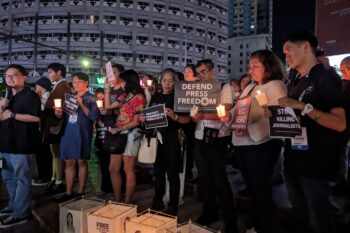Arthur Ranque, head of the 19-member traffic enforcers, said drivers and vehicle owners are now more conscious about vehicle registration, accessories, road safety, and driver licensing than before, as his office noted an increase in apprehension of violators since the last quarter last year.
The spike in the arrests started when the LTO dispatched traffic enforcers in both north and south Bukidnon. As of the end of March this year, the women enforcers had apprehended a total of 1,119 violators and impounded 59 vehicles. But they have also become the object of drivers’ anger.
Drivers spoke to this reporter about the alleged arrogance of some of the lady enforcers. But Ranque claimed the women were just trying to be polite and firm at the same time.
“Working to remove Bukidnon from the top of the country’s most accident prone areas is still a big challenge for us,” he said, adding they needed additional logistics support and strategies to go after violators.
Ranque assured that law enforcement “does not discriminate violators” citing cases of apprehended politicians and policemen alike or even their own personnel.
He said some politicians or influential persons lobbied at the Capitol for exemption or to tell the governor that the “Yellow Ladies” should be reprimanded for alleged arrogance “pero wala may nakalusot (but nobody was exempt from the law). The governor was fair about it,” he said.
The “Yellow Ladies” are employees of the provincial government. Only Ranque is from the Land Transportation Office.
Ranque cited difficulties in the implementation, among them, the threats received by “Yellow Ladies’” that they would be shot or harmed along the way.
Ranque said they have conducted 51 orientation seminars for violators in the last three months. As the likely consequence, the ratio of motor vehicle registration violators to the total number of violators of various traffic regulations has decreased from 42 percent to 38 percent to 20 percent from January to March 2009.
He also said that revenues derived from the enforcement of traffic laws has increased to a level that allowed the provincial government to finance its own traffic enforcement.
For the first quarter of this year, LTP-PGO earned P704,142 in law enforcement revenue. For the last quarter of 2008, LTO collected a total of P1.137 million for law enforcement revenues.
He said that the province gets 7.5 percent of the Motor Vehicle User's Charge (MVUC) collected in the province in forms of infrastructure funding.
He said the support of the provincial government in traffic enforcement has always been crucial. In the past, Gov. Jose Ma. R. Zubiri balked at deputizing agents for law enforcement claiming the LTO is prone to corruption.
Ranque claimed the women enforcers were believed to be more reliable saying that “they could not afford to extort even a peso since it would mean losing their job”.
He admitted they still do not have enough gauge yet to compare if the &ld
quo;Yellow Ladies” have created an impact in improving travel safety in Bukidnon.
“Many did not register their vehicles because there were no enforcement of the law. In fact, there has been a proliferation of fake driver’s licenses,” Ranque said.
But the presence and apprehensions made by the traffic enforcers “have become a deterrent to a certain extent, especially when they don’t post in a particular site and time”.
“Drivers say they have to be vigilant,” he said. (Walter I. Balane / MindaNews)
